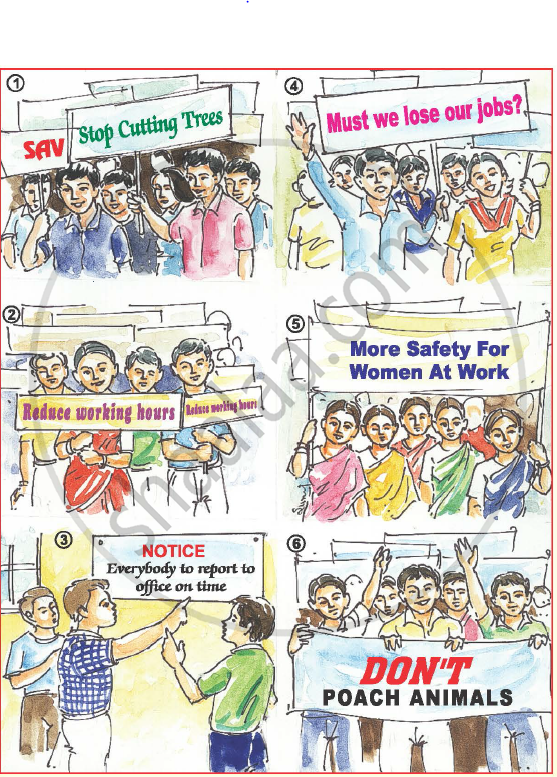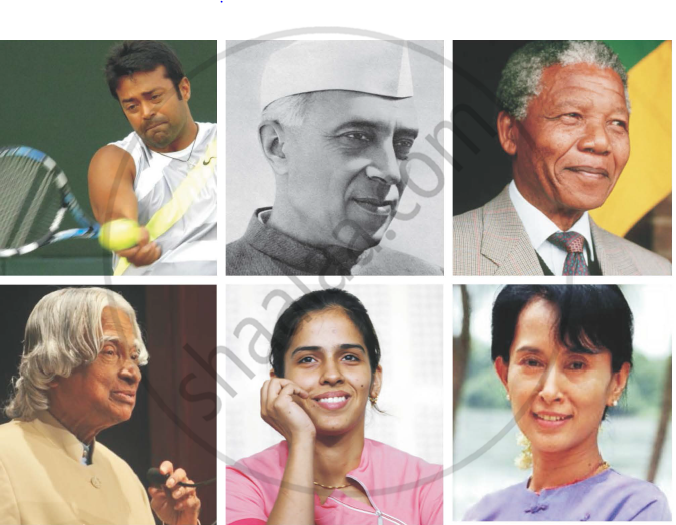Advertisements
Advertisements
प्रश्न
Combine the following pair of sentence by changing the adjective to a
noun.
5. James was silent during the enquiry. It did not help the police in bringing the culprit to book .
______________________________________________________________
उत्तर
James’s silence during the enquiry did not help the police in bringing the culprit to book.
APPEARS IN
संबंधित प्रश्न
Study the cartoons below:

What are the people trying to say? Study the first example and then
complete the rest of the sentences using the same pattem.
1. They are protesting against cutting down of trees______________
2. They are demanding--------------------
3. The boss insists on everyone------------------
4. They are worried about-----------------
5. The women are demanding safer----------------------
6. They want the Government to put a ban on-----------------
Combine the following sentence by nominalising the first verb.
The bomb exploded. This shattered the window panes.
The window panes were shattered due to ----------
Combine the following sentences by nominalising the first verb.
Thousands of people participated in the charity walk .This helped Cancer Aid
Society to raise funds for treatment of cancer patients. _______________ helped Cancer Aid Society raise funds for treatment of cancer patients.
Combine the following sentences by nominalising the first verb.
The number of young people consuming drugs is growing .This has become an
issue of social concern. ______________ by a growing ---------- concern.
Combine the following sentences by nominalising the first verb.
Mandela had spearheaded the fight against apartheid. He was jailed for
this. Mandela was jailed for __________________
Combine the following sentences by nominalising the first verb.
He committed a series of crimes. He was given severe punishment.
He was _________________________
Combine the following pair of sentence by changing the adjective to a
noun.
4. The young businessman was extravagant. It led to his downfall.
________________________________________________________
What type of people do you like most? In the box below there are some suggestions about different types of people. Discuss with your partner and tell him at least five qualities that you like and five that you do not like. You may add more words to the list given below.
|
extravagant honest smart intelligent compassionate ruthless stubborn miserly witty responsible sincere lively reserved diplomatic generous shy talkative handsome arrogant patient ambitious |
Now share your suggestions with the rest of the class. Your teacher will build up a list of qualities (adjectives) on the blackboard. Add them to the adjectives
above and classify them under two columns, namely desirable and undesirable.
Let's Play a Guessing Game:
Work in pairs: Study the pictures given below. Partner A can think of any
one of the personalities and describe the qualities for which he admires
him/her. Partner B must guess the person being described. You may give
a maximum of three clues in three chances to guess the answer correctly.
You may carry on the game with other famous personalities of your choice


Example: He is a national leader. I admire him for his vision, statesmanship and
intelligence. Who is he?
Ans: Is he Jawaharlal Nehru?
(Note: Even though someone is dead, we can still use the present tense when we talk about the qualities we admire)
Read the list of activities given below. On an average which activity, according to you, uses the most energy. Order the activities from those that use most energy to the least. When you have finished, discuss the order with your partner using the 'ing' form eg:
Example: I think jogging uses the most energy.
No I don't think so. I think swimming uses more energy.
OK perhaps swimming is second. After that, I think cycling .. specially if it is
uphill.
| ACTIVITY | ORDER |
| climbing with backpack | |
| jogging | |
| cycling | |
| sweeping | |
| brisk walking | |
| playing tennis | |
| swimming fast | |
| watching television | |
| playing cricket |
